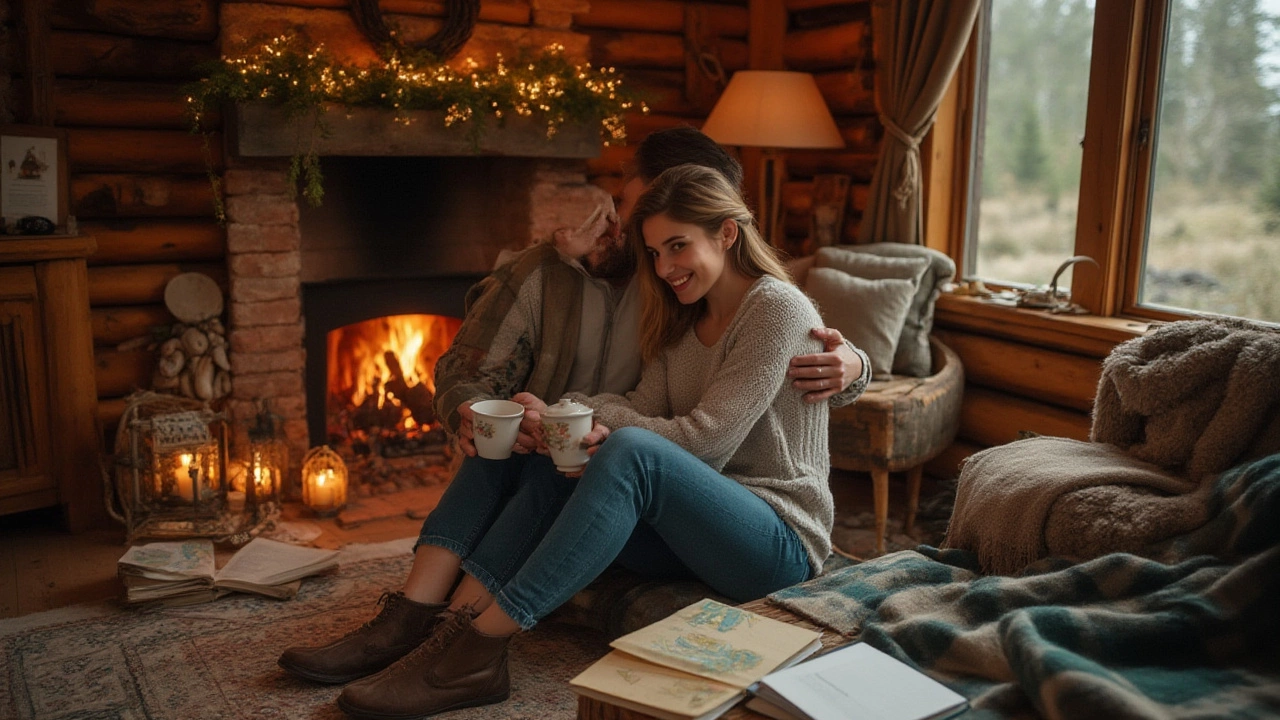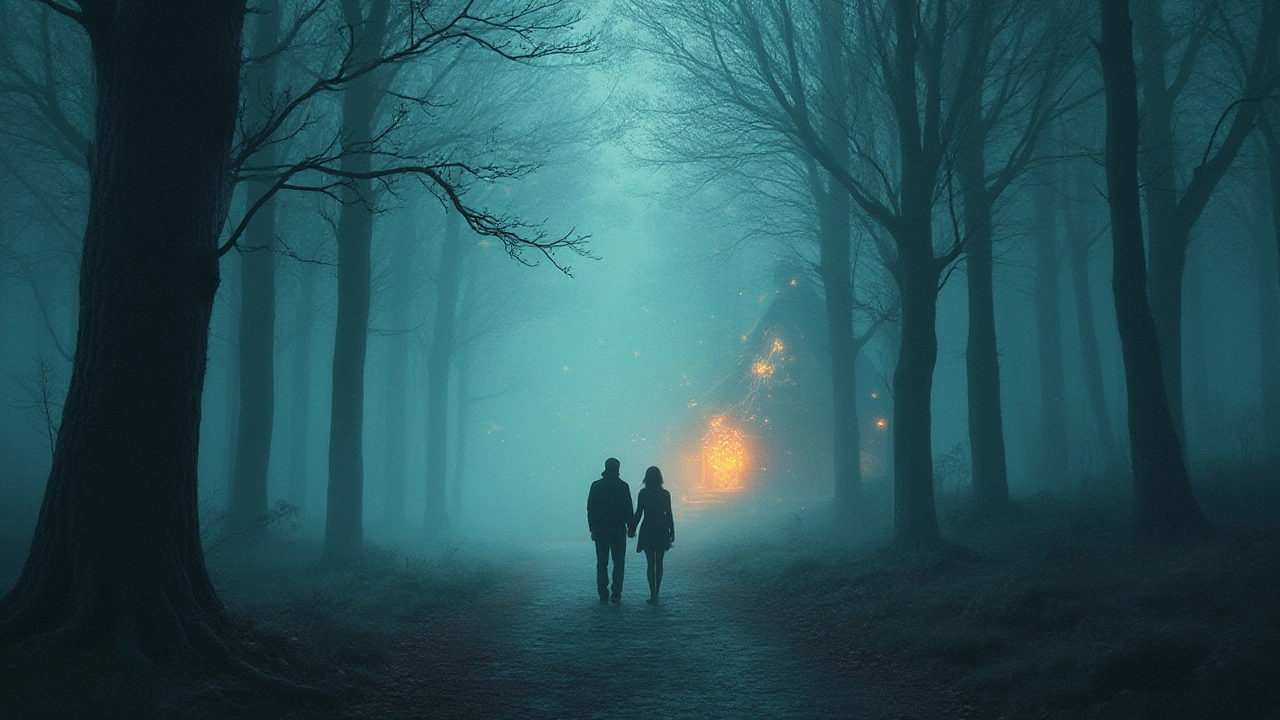Picture this: you’re with someone special, and there’s candlelight flickering on a wooden table as the fire crackles softly. Outside, you hear nothing but trees whispering in the breeze and maybe a distant owl. You’re tucked into a thick duvet while rain taps gently on the window. When you think about romance, most people picture scenes like this—far removed from city lights, screens, and the constant buzz. But what gives cabins that undeniable romantic charm?
The Power of Place: Why Nature Sets the Mood
There's something about nature that softens even the tensest nerves. More than one scientific study has found that spending time in the woods or surrounded by greenery can lower cortisol, the stress hormone, which means people just feel better—and more open to each other—when they’re not stuck in traffic or fielding endless notifications. A 2022 survey by Booking.com reported that around 44% of couples say they feel ‘more connected’ after a trip in nature versus a standard urban holiday. Cabin getaways make this easy: trees, mountains, and lakes sit just outside your door, turning every moment into an opportunity for togetherness. Even just taking a walk or sitting on the porch in the morning fog feels different in a cabin—slower, more present, more real. For couples who rarely get five minutes alone without interruption, a cabin instantly changes the pace, helping both people tune into each other.
The sensory experience in a cabin makes a difference, too. Natural wood smells, the feel of thick blankets, the way sunlight spills through the window in ways it never seems to hit at home—these simple elements ground you. Without constant artificial noise, you start noticing the rhythm of each other's voices and breathing. There’s magic in the mundane when the world feels peaceful and private. And there’s a reason why psychologists often suggest ‘getting away’ for rekindling a spark: cabins offer simplicity that lets intimacy come naturally.
Nature also brings out a sense of adventure—think exploring hiking trails, discovering a waterfall, or simply getting lost together (on purpose) in the woods. These tiny adventures release oxytocin, the “bonding” chemical, something proven to deepen emotional connections. In fact, couples who try new activities together often report feeling more satisfied and closer. A recent University of Michigan study claims that trying new things with a partner triggers the same dopamine hit as falling in love did at the start of your relationship. In a cabin, every new trail or cooking experiment can spark fresh, shared memories, adding to the sense of romance.
It's not just the outdoors that works its magic. Nighttime in a cabin is an experience in itself. Starlit skies away from city glare beg for stargazing—no telescope needed, just a blanket and a bottle of wine. Couples can share stories, laugh, and simply exist together without pressure or distraction. And something as simple as eating on a deck with faraway city lights glowing below can feel more special than a night out in a fancy restaurant.
Privacy and Seclusion: Space to Be Yourselves
One of the most underrated facts about cabins is how they guarantee privacy in a way hotels never can. Hotels mean other people: busy hallways, thin walls, scheduled breakfasts. But in a cabin—especially a secluded one—you make your own rules. No one’s judging if you stay in pajamas until midday or skinny-dip in a nearby lake. You’re in your own little universe, free from prying eyes. This freedom sparks a different kind of intimacy—one based on feeling safe and unobserved.
In a survey by Airbnb, hosts noted a sharp increase in couples booking isolated cabins post-pandemic, and nearly 60% of guests said privacy was the main reason. In Cape Town, where I live, couples flock to places like the Cederberg or the Drakensberg foothills just to get away from crowds and noise. But you’ll see this everywhere: from Scandinavia’s lake cottages to the Blue Ridge Mountains in Georgia or even tiny cabins right outside Paris. Privacy isn’t just nice—it’s vital for romance because it lets people drop their guards. My friend Lindiwe once confessed she and her partner only really talk about the “big stuff” when they escape to a cabin, not at home where real life gets in the way.
Cabins encourage you to slow down and pay attention, which rarely happens in daily life. Without anyone around to interrupt, couples often report finding themselves in deeper conversations, sharing silly jokes or dreams for the future—things that usually get lost among dishes, emails, and to-do lists. Plus, there’s the simple joy of having no schedule. You can wake up together, make breakfast on the porch, sip coffee in silence, or spend an entire afternoon reading side-by-side. That sort of idleness can be a luxury, making time slow down just for the two of you.

The Allure of Simplicity: Unplugging Is Underrated
Modern life is non-stop: phones buzz, TVs blare, and someone always needs something. Cabins flip all of this upside down. Wi-Fi is patchy or, if you’re lucky, nonexistent. Entertainment becomes about the two of you, maybe a board game, cooking together, or building a fire. Research from the Global Wellness Institute found that couples who intentionally unplug for a weekend show a boost in relationship satisfaction for weeks afterward. It’s almost like hitting “reset”—all the expectations, irritations, and responsibilities fade into the background.
One practical tip? Bring only what you need and leave work behind. If you promise each other not to check email or the news, you’ll notice a difference almost immediately. Tell friends and family you’ll be offline. I’ve seen parents return from a cabin weekend not only closer but better equipped to deal with everyday chaos—almost as if the pause gave them superpowers. My daughter Sonia once asked if we were different people after a cabin break because she noticed how chilled out we were—she’s not wrong!
Simple rituals become the highlight: making pancakes, taking turns at a jigsaw puzzle, maybe even picking wildflowers if it’s that sort of place. When you’re free from the tyranny of schedules and notifications, you rediscover joys in just being together, without the need to impress or perform. So much so that many couples end up bringing little things from the cabin experience back home. It might be a new hobby (hello, sourdough starter!) or just the habit of a morning coffee together—small reminders that romance isn’t swept away by daily life, just hidden under the noise.
Cabins also reinforce the importance of analog fun. Board games, listening to vinyl, reading aloud—all these things slow you down and create laughter or shared wonder. Instead of watching screens alone, you do things with each other. The benefit here is twofold: your brain actually releases more pleasure chemicals when you share physical space and activities, and you build shared memories that grow more valuable the further away from the cabin you get.
Design, Atmosphere, and the Magic of Cabin Details
Let’s get real: aesthetics matter. Cabins are usually built to feel cozy—natural wood, fireplaces, soft lighting. It’s hygge without trying too hard. Architects design cabins to promote comfort and warmth, pairing big windows with soft throws, or maybe deep bathtubs perfect for two. In Scandinavia, the “snug” factor is so ingrained in cabin and cottage culture that some Danish cabins even come with a basket of scented candles, board games, and sheepskins provided as standard. It’s not just marketing—these details matter for mood and comfort.
Furniture is built for lingering. Unlike stiff hotel chairs, cabins invite you to sink in, curl up, or spread out. Even a small sofa in front of the fire suddenly becomes the spot for whispered secrets. Designers often use open-plan layouts, blending kitchen, dining, and living areas into one, which is perfect for sharing every single moment, from chopping veggies to watching flames in the fireplace. Romantic cabins often have big beds under picture windows or lofted sleeping spaces you reach by ladder, encouraging a childlike sense of adventure.
Lighting is another unsung hero. Lamps with warm bulbs, fairy lights, and the glow of a wood fire all signal to your brain (and heart) that it's time to relax. In fact, some studies have found that soft lighting actually lowers blood pressure and boosts feelings of trust. Even rain-smudged windows can add to the feeling—coziness is heightened by weather you can watch from a safe, warm spot together.
Don't forget scent and sound. Woodsmoke, pine needles, or even baking bread—these trigger that sense of "home" without any baggage. Some cabins provide record players or a stack of classic novels, making unplugging even more appealing. Couples who usually default to scrolling on their phones suddenly find themselves playing music, sharing old stories, or writing postcards to each other by candlelight. That’s where true connection happens—unrushed, undistracted.
| Cabin Feature | How It Adds to Romance |
|---|---|
| Wood Fireplace | Warmth, cozy atmosphere, natural focal point for conversation |
| Big Windows | Views of nature, inviting morning light, connection to outdoors |
| Private Deck | Outdoor dining and stargazing, makes every meal special |
| Soaking Tub or Hot Tub | Relaxation, luxury, perfect for unwinding together |
| Soft Throws and Blankets | Encourage cuddling, comfort, and lingering together |

Tips for Planning a Romantic Cabin Getaway
If you’re craving that fresh, sparkly, just-the-two-of-us feeling, picking the right cabin (and approach) makes all the difference. Here’s what I’ve learned—from both blissful trips and the "oops, forgot to pack wine" kind of weekends:
- Prioritize privacy over amenities: Hot tubs and fancy kitchens are great, but nothing beats a secluded setting. Look for cabins that aren’t sandwiched between others, even if it means a simpler space.
- Time your trip right: It’s not just about the place, but the pace. Off-season or shoulder-season escapes offer better prices, fewer crowds, and more peace.
- Pack for comfort and connection: Cozy pajamas, your favorite snacks, and personal touches—like a playlist or book you’ll both enjoy. Leave work at home.
- Plan some activities, but leave room for spontaneity: Have backup ideas for rainy days (baking, massages, or board games), but don’t overschedule. Part of the magic is being a little bored together.
- Lean into analog fun: Try reading aloud or making a fire together. Old-school activities bring real connection, and you’re less likely to miss your phone.
- Be honest about your needs: If one of you hates hiking, don’t force it. Choose places and plans that both of you find exciting, not just what looks good on Instagram.
- Include a shared ritual: Whether it’s breakfast in bed or an evening walk, a mini-tradition makes the trip stand out for years.
- Don’t stress the small stuff: Power outages, bad weather, or a mouse stealing your bread (yes, it happened to me)—laugh it off. The best memories usually start as mishaps.
Here’s the thing: romance isn’t about grand gestures. It’s about slowing down, tuning in, and letting that person you love feel like your whole world—even just for a weekend. Cabins make that possible, not by magic, but by stripping away everything else so all that’s left is the two of you, a crackling fire, and enough quiet to hear your heart again.